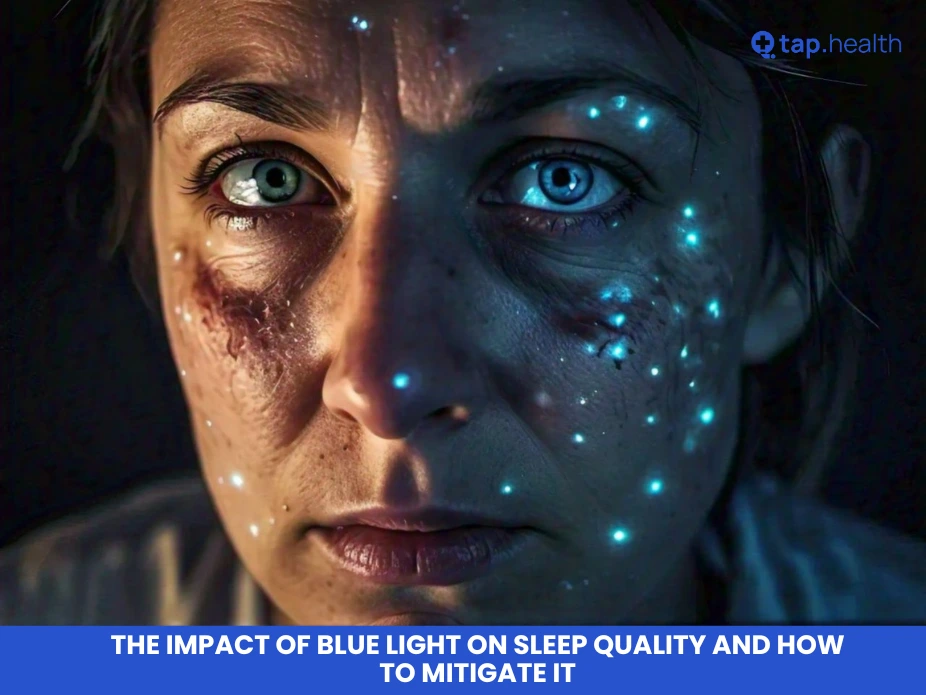In our digital age, screens are everywhere—from smartphones and tablets to computers and TVs. While these devices offer countless benefits, they also emit blue light, which can significantly impact our sleep quality. Understanding how blue light affects our sleep and learning ways to mitigate its effects can lead to better rest and overall well-being. Let’s dive into the science behind blue light, its impact on sleep, and practical strategies to reduce its negative effects.
What is Blue Light?
Blue light is a high-energy, short-wavelength light that is visible to the human eye. It is naturally present in sunlight and plays a crucial role in regulating our sleep-wake cycle, also known as the circadian rhythm. However, with the increasing use of electronic devices, we are exposed to artificial sources of blue light, especially during evening hours.
Natural vs. Artificial Blue Light
- Natural Blue Light: Emitted by the sun, it helps maintain alertness, memory, and cognitive function. It also regulates melatonin production, which is essential for sleep.
- Artificial Blue Light: Emitted by LED screens, smartphones, tablets, and fluorescent lights. Prolonged exposure, especially at night, can disrupt the circadian rhythm.
Reference: Harvard Health
How Blue Light Affects Sleep Quality
Exposure to blue light, particularly in the evening, can interfere with the body’s ability to prepare for sleep. Here’s how:
Suppression of Melatonin Production
Melatonin is a hormone that signals the body to prepare for sleep. Blue light inhibits melatonin production, making it harder to fall asleep and reducing sleep quality.
Disruption of Circadian Rhythm
The circadian rhythm is our internal clock that regulates sleep-wake cycles. Blue light exposure at night can shift this rhythm, leading to delayed sleep onset and reduced REM sleep.
Increased Alertness
Blue light boosts alertness and can make it difficult to wind down before bedtime. This increased alertness can lead to longer time to fall asleep and fragmented sleep patterns.
Real-Life Scenarios
Scenario 1: Emily’s Evening Screen Time
Emily loves watching TV and browsing social media before bed. Over time, she noticed she was having trouble falling asleep and often felt tired the next day. After learning about blue light, Emily started using blue light filters on her devices and reduced screen time an hour before bed. She found that she fell asleep faster and felt more rested in the morning.
Scenario 2: Mark’s Shift Work Challenge
Mark works night shifts and uses screens extensively during his work hours. Struggling with sleep during the day, he began using blue light-blocking glasses and adjusting his lighting at home to warmer tones. These changes helped him improve his sleep quality and feel more alert during his waking hours.
Expert Contributions
Dr. Devaki, a sleep specialist, explains, “Blue light is a double-edged sword. While it’s essential during the day for maintaining alertness and regulating our internal clocks, excessive exposure at night can wreak havoc on our sleep quality. Implementing simple strategies to reduce blue light exposure can make a significant difference in sleep health.”
John Doe, a technology expert, adds, “Many devices now come with built-in blue light filters or ‘night mode’ settings. Utilizing these features, especially in the evening, can help mitigate the adverse effects of blue light on sleep.”
Recommendations Grounded in Proven Research and Facts
Research has consistently shown that reducing blue light exposure in the evening can enhance sleep quality. Here are evidence-based strategies to mitigate the impact of blue light:
1. Limit Screen Time Before Bed
Aim to reduce the use of electronic devices at least one hour before bedtime. Engaging in relaxing activities, such as reading a physical book or practicing meditation, can help signal your body that it’s time to wind down.
2. Use Blue Light Filters
Most smartphones, tablets, and computers have settings that adjust the display to emit warmer light during evening hours. Apps like f.lux can also help reduce blue light emission from screens.
Reference: Mayo Clinic
3. Wear Blue Light-Blocking Glasses
Specialized glasses that block blue light can be worn in the evening to reduce exposure. These glasses filter out a significant portion of blue light, helping to maintain melatonin levels.
4. Adjust Your Lighting
Use dim, warm-colored lights in the evening instead of bright, cool-toned lighting. Consider using lamps with adjustable settings to create a more relaxing environment.
5. Create a Sleep-Conducive Environment
Ensure your bedroom is dark, quiet, and cool. Investing in blackout curtains and white noise machines can further enhance sleep quality by minimizing disruptions.
Reference: National Institutes of Health
6. Maintain a Consistent Sleep Schedule
Going to bed and waking up at the same time every day helps regulate your internal clock, making it easier to fall asleep and wake up naturally.
Factual and Reliable Information
Understanding the science behind blue light and its impact on sleep is crucial for making informed decisions about screen usage and sleep hygiene. The body’s response to blue light is a natural evolutionary trait, but modern technology has introduced challenges that were not present in the past. By implementing research-backed strategies, individuals can significantly improve their sleep quality and overall health.
The Science Behind Blue Light and Sleep
Blue light influences the suprachiasmatic nucleus (SCN) in the brain, which is responsible for controlling the circadian rhythm. Exposure to blue light during the day is beneficial, promoting alertness and cognitive function. However, exposure in the evening disrupts the SCN’s ability to prepare the body for sleep, leading to difficulties in falling asleep and maintaining deep sleep stages.
Long-Term Health Implications
Chronic sleep deprivation caused by blue light exposure can lead to a variety of health issues, including:
- Mood Disorders: Increased risk of depression and anxiety.
- Cognitive Impairment: Reduced memory and concentration.
- Metabolic Issues: Higher likelihood of obesity and diabetes.
- Cardiovascular Problems: Elevated risk of heart disease.
Frequently Asked Questions (FAQ) on The Impact of Blue Light on Sleep Quality and How to Mitigate It
1. What is blue light, and where does it come from?
Blue light is a type of high-energy visible light that is present in natural sunlight and emitted by artificial sources like LED screens, smartphones, tablets, and fluorescent lights.
2. How does blue light affect my sleep?
Blue light suppresses the production of melatonin, a hormone that regulates sleep-wake cycles. This suppression can make it harder to fall asleep and reduce sleep quality.
3. Are there any benefits to blue light exposure?
Yes, during the day, blue light helps maintain alertness, improves mood, and enhances cognitive function. It also plays a role in regulating the circadian rhythm.
4. Can blue light-blocking glasses help improve sleep?
Yes, blue light-blocking glasses can reduce the amount of blue light reaching your eyes in the evening, helping to maintain melatonin levels and improve sleep quality.
5. Is it necessary to eliminate all screen time before bed?
While it may not be necessary to eliminate all screen time, reducing exposure and using blue light filters or settings can significantly improve sleep quality.
6. How can I adjust my environment to reduce blue light exposure?
Use dim, warm-colored lighting in the evening, install blackout curtains in your bedroom, and create a sleep-conducive environment by minimizing noise and maintaining a comfortable temperature.
7. Are there any apps that can help reduce blue light from screens?
Yes, apps like f.lux for computers and Night Shift for iOS devices adjust the color temperature of your screen to reduce blue light emission during evening hours.
8. How long does it take for blue light exposure to affect sleep?
Blue light can affect melatonin production and sleep onset within minutes of exposure. It’s recommended to reduce blue light exposure at least one hour before bedtime.
9. Can children be affected by blue light?
Yes, children are also susceptible to the effects of blue light. It’s important to monitor and limit screen time, especially before bed, to ensure healthy sleep patterns.
10. What are some natural ways to improve sleep quality?
Maintaining a consistent sleep schedule, creating a relaxing bedtime routine, exercising regularly, and managing stress are all natural ways to improve sleep quality.
Conclusion
Blue light is an integral part of our daily lives, influencing everything from our mood to our sleep patterns. While it offers benefits during daylight hours, excessive exposure, especially in the evening, can disrupt sleep quality and overall health. By understanding the impact of blue light and implementing practical strategies to reduce its effects, you can enhance your sleep quality and improve your well-being. Whether it’s adjusting your screen settings, wearing blue light-blocking glasses, or creating a more sleep-friendly environment, these simple changes can make a significant difference in your nightly rest.
For more information on blue light and sleep, visit Harvard Health and National Sleep Foundation.
References:
- Harvard Health. Blue Light Has a Dark Side
- Mayo Clinic. Sleep Tips: Blue Light and Sleep
- National Institutes of Health. Blue Light and Health



